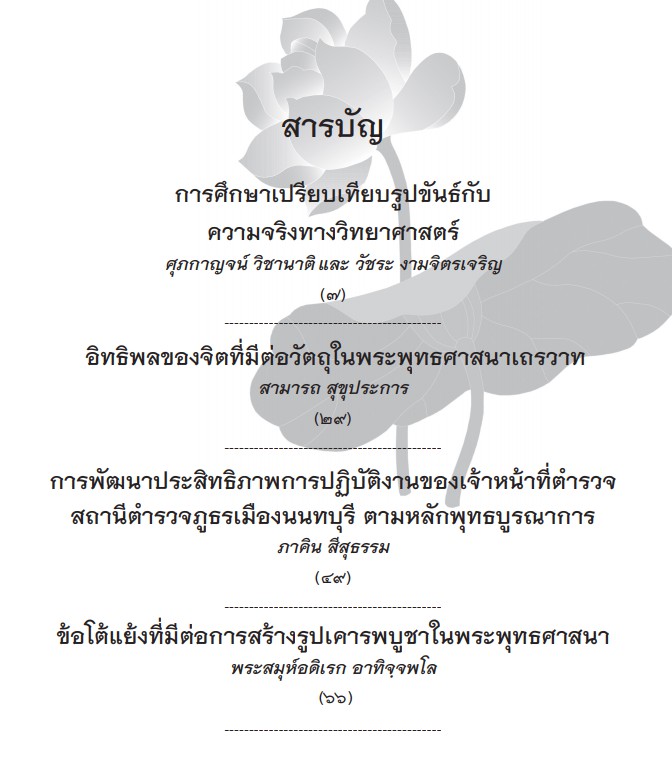The Influence of the Mind over Matter in Theravada Buddhism
Keywords:
Influence of Mind on Matter, Mind Wave, Quantum Mind, Wave-ParticlesAbstract
The mind comes into being and goes out of existence continuously, a trillion times per snap of one’s fingers, causing high-frequency ripple waves in the space surrounding the mind, according to the Time-Space theory. In Double-slit experiments, materials in duality states of waves or particles transform themselves into waves upon passing through the double slits. However, if they are observed, they will maintain their particle state. This means that mind-generated waves can interfere with particulate waves. The mind therefore may influence larger material objects as all material objects are composed of particles.
Downloads
References
คันธสาราภิวงศ์, พระ. ๒๕๓๒. อภิธรรมมัตถสังคหะ และปรมัตถทีปนี. พิมพ์ครั้งที่ ๓. กรุงเทพฯ : ประยูรสาส์น.
พรหมคุณาภรณ์ (ป.อ. ปยุตฺโต), พระ. ๒๕๔๖. พจนานุกรมพุทธศาสตร์ ฉบับประมวลธรรม. พิมพ์ครั้งที่ ๑๒. กรุงเทพฯ: มหาวิทยาลัยมหาจุฬาลงกรณราชวิทยาลัย.
พุทธโฆษาจารย์, พระ. พระวิสุทธิมรรค. แปลจากอรรถกถาพระวิสุทธิมรรค.ชำระและตรวจสอบทาน วงศ์ ชาญบาลี. กรุงเทพฯ : ธรรมบรรณาคาร (อำนวยสาส์น).
พุทธทาสภิกขุ, ๒๕๕๔. พจนานุกรมธรรมฉบับพุทธทาส. กรุงเทพฯ: ธรรมสภา.
มหาจุฬาลงกรณราชวิทยาลัย. ๒๕๓๙. พระไตรปิฎกฉบับภาษาไทย ฉบับมหาจุฬาลงกรณราชวิทยาลัย. กรุงเทพฯ: โรงพิมพ์มหาจุฬาลงกรณราชวิทยาลัย.
แมททิวส์, โรเบิร์ต. ๒๕๕๑. ๒๕ ความคิดพลิกโลก (๒๕ Big ideas). แปลโดย ชัยวัฒน์ คุประตกุล. กรุงเทพฯ: สำนักพิมพ์วีวิชช์.
ระวี ภาวิไล. ๒๕๔๓. โลกทัศน์ ชีวทัศน์ เปรียบเทียบ วิทยาศาสตร์กับพุทธศาสนา. กรุงเทพฯ: สหธรรมิก.
ลีดบีท, ซี. ดับบลิว. ๒๕๓๙. กายทิพย์ (Man Visible and Invisible). พิมพ์ครั้งที่ ๒. แปลโดย ศิริ พุทธศุกร์. กรุงเทพฯ: โรงพิมพ์วิญญาณ.
วัชระ งามจิตรเจริญ. ๒๕๕๔. สมการความว่าง. กรุงเทพฯ: กรีนปัญญาญาณ.
สมภาร พรมทา. ๒๕๓๙. คือความว่างเปล่า. กรุงเทพฯ: สำนักพิมพ์พุทธชาด.
สามารถ สุขุประการ. ๒๕๕๑. ปรากฏการณ์บิ๊กแบงในมุมมองของพระพุทธศาสนา. (วิทยานิพนธ์พุทธศาสตรมหาบัณฑิต. บัณฑิตวิทยาลัยมหาจุฬาลงกรณราชวิทยาลัย.
________. ๒๕๕๗. อิทธิพลของจิตที่มีต่อวัตถุในทัศนะของพระพุทธศาสนาเถรวาท. (ดุษฎีนิพนธ์พุทธศาสตร์. บัณฑิตวิทยาลัยมหาจุฬาลงกรณราชวิทยาลัย.
อุปติสสเถระ, พระ. ๒๕๔๑. วิมุตติมรรค. แปลโดย พระราชวรมุนี (ประยูร ธมฺมจิตโต) และคณะ. พิมพ์ครั้งที่ ๕. กรุงเทพฯ: ศยาม.
ฮอว์คิง, สตีเฟน. ๒๕๔๖. จักรวาลในเปลือกนัท. แปลโดย รอฮีม ปรามาท. กรุงเทพฯ : บริสุทธิ์การพิมพ์.
ภาษาอังกฤษ
(I) Books:
Baker, Joanne. (2013). 50 quantum physics ideas. London: Quercus Editions Ltd..
DK London. (2014). The Science Book. London: Dorling Kindersley Limited.
Dunne, Brenda J. And Jahn, Robert G., (2011). Consciousness and the Source of Reality. New Jersey: Princeton.
Dunne, Brenda J. And Jahn, Robert G.. (1995). Consciousness and Anomalous Physical Phenomena.
Princeton Engineering Anomalies Research, School of Engineering and Applied Science, Princeton University, Princeton, NJ 08544.
Edge, Hoyt L., Morris, Robert L., Rush, Joseph H., Palmer, John. (1987). Foundation of Parapsychology: Exploring the Boundaries of Human Capability. London: Routledge & Kegan Pual Ltd.
Kaku, Michio. (2014). The future of the mind: the scientific quest to understand, enhance, and empower the mind. New York. City of New York.
McTaggart, Lynne. (2007). The Intention Experiment: Using your thoughts to change your life and the world. New York: Free Press.
Mindell, Arnold. (2004). The Quantum Mind and Healing. USA: Hampton Roads Publishing Company.
(II) Articles
Dunne, Brenda J. And Jahn, Robert G., (1986). On The Quantum Mechanics of Consciousness with Application to Anomalous Phenomena. Foundation of Physics. Page 721-772. Vol.16, No.8.
Jahn, R.G., Dunne, B.j. , And Nelson, R.D., “Engineering Anomalies Resaerch”, Journal of Sciencific Exploration. Page 21-50. Vol.1, No.1.
Radin, Dean., Michel, Leena., Galdamez, Karla., Wendland, Paul., Rickenbach, Robert., and Arnaudelorme. (2012). Consciousness and the double-slit interference pattern: Six experiments Physics. Essays Vol. 25, 2.157-171.
Downloads
Published
How to Cite
Issue
Section
License
บทความที่ได้รับการตีพิมพ์เป็นลิขสิทธิ์ของศูนย์พุทธศาสน์ จุฬาลงกรณ์มหาวิทยาลัย
ข้อความที่ปรากฏในบทความแต่ละเรื่องในวารสารวิชาการเล่มนี้เป็นความคิดเห็นส่วนตัวของผู้เขียนแต่ละท่านไม่เกี่ยวข้องกับศูนย์พุทธศาสน์ จุฬาลงกรณ์มหาวิทยาลัย และคณาจารย์ท่านอื่นๆในมหาวิทยาลัยฯ แต่อย่างใด ความรับผิดชอบองค์ประกอบทั้งหมดของบทความแต่ละเรื่องเป็นของผู้เขียนแต่ละท่าน หากมีความผิดพลาดใดๆ ผู้เขียนแต่ละท่านจะรับผิดชอบบทความของตนเองแต่ผู้เดียว






